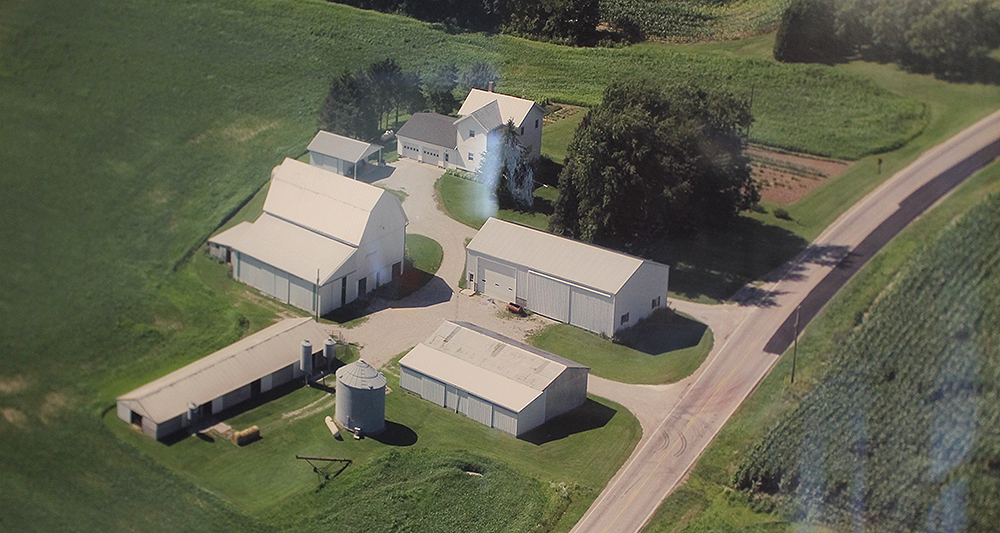Kenny Adams
Kenny Adams’ earliest memory on the farm was with his father and two brothers. His father helped his uncle run a session rake while he and his brothers thrashed wheat in the fields. He also helped his uncle in the saw mill. Like many other farming families, the Adams family made maple syrup. Kenny has farmed nearly all of his life. Now, two of Kenny’s four sons, Jay and John, run the family farm operation. It is located on Plymouth Springmill Road, outside of Shelby.
Kenny farmed the original 80 acres his father owned, but rented most of his acreage from other landowners. As Kenny’s sons got older, they bought and rented more land. At one time, they were farming nearly 3,000 acres. While the acreage they farmed grew, the Adams family also raised cattle. Kenny converted a chicken house into a 100-head cattle feed house. Today, the Adams’ raise between 350 and 400 head of cattle per year.
The transition from helping his father farm and farming on his own was not an easy task for Kenny. His father died at age 58; Kenny was 23 and shifted to farming full-time. Despite the fact that Kenny’s father died at a young age, he showed Kenny everything he knew about agriculture. According to Kenny his father said, “I’ll show ya. If you need help, I’ll help ya again.” He admitted he learned more about farming through experience than by being told.
Like so many of his farming colleagues, Kenny started farming with a two-plow tractor – a John Deere Model B. His father used a team of horses but Kenny rarely worked with them; he felt more comfortable operating a tractor. He inherited another two-plow tractor when his father died. After that, he updated tractors frequently and took advantage of more powerful machines. Kenny’s first tractor had 37 horsepower; he now rides in one with over 300 horses.
Growing up, Kenny’s father owned chickens, milk cows, beef cattle, hogs, and sheep. The Adams family started out with farm animals out of necessity; they always had some type of animal living on the farm. Kenny concluded that milk cows were the hardest animals to take care of on the farm; they required a lot of attention, seven days per week. So, he switched to Holstein beef cattle. Kenny made more money from Holstein Cattle than any other breed.

Kenny’s father milked cattle by hand. Eventually, he bought milking equipment, but the system still required someone to dump milk into bulk tanks. After Kenny took over the farm, he never upgraded milking equipment because it was far too expensive.
After milking and harvesting, Kenny transported his products to local establishments for sale. Milk was hauled to Shelby Pure Milk and grain was transported to the Shelby Equity. Also, Kenny sold his cattle at the Cleveland Livestock Yard, which like the two companies in Shelby, is not there anymore. The Adams family was forced to sell their products in Shelby over the years because it was so close. Today, Kenny’s sons transport product to the place that gives them the highest price.
Not long after Kenny started farming, he met his wife Joyce. Today, they have been together nearly 57 years. Because Joyce grew up on a farm, she understood Kenny’s profession. However, other than gathering chicken eggs Joyce did not help on the farm. After Kenny worked for Cass Township and Firestone in Shelby for a few years, Joyce decided Kenny should be at home farming while she worked.
Although Kenny started farming with a John Deere Model B, he and his sons have been avid Case IH owners for decades. For Kenny it was not about the brand, “I’ve always had good dealers; that was half of the bit was service and it still is today as far as I’m concerned.” Case IH dealers always treated Kenny well, so he remained loyal to them.
Kenny tried no-till farming for a few years. After poor yields, he went back to plowing. Today, Kenny’s sons no-till their wheat fields and some bean fields; they noticed corn did not do as well when the earth was left untilled. Over the years, the Adams family created waterways in fields and installed tile to improve drainage. The Adams family has integrated these and other conservation practices into their farming.
Kenny’s sons also vaccinate their own livestock. He mentioned, “They got medicine there for them; they know what to give them”. . . “After you’re around that stuff so long you know what’s wrong with them.” According to Kenny, experience is crucial while working on a farm.
In the neighborhood around the Adams’ family farm everyone helped each other. Five or six different farms helped one another bail hay or do anything that needed done. Kenny stated, “That’s the way it was in the neighborhood; if you needed help, your neighbor would help you and if he needed help he’d come and get you and you’d go help him. That was the way it was.”
In 2010, Kenny and Joyce moved from their farm to the city of Shelby. The move made things easier and more manageable for the couple. Kenny mentioned that it was not hard moving away from the farm; he can still return whenever he likes. He noted that young farmers have to like it in order to make it in farming today. Instead of having everything at once, new farmers have to start small and work their way up.
The Adams family was not successful overnight. Kenny’s father started off with 80 acres and his sons expanded it to nearly 3,000 with approximately 400 beef cattle. Kenny enjoyed his time on the farm and worked hard, eventually passing it on to his two sons. The Adams family farm operation will continue to grow thanks to Kenny’s children and grandchildren.
“The best teacher you can get is being out there and doing it; make a mistake.”
Kenny Adams